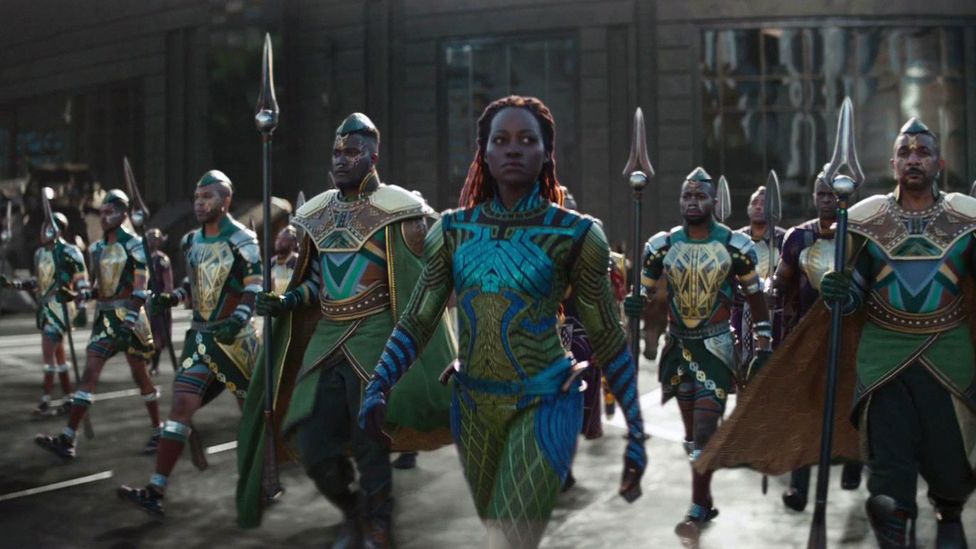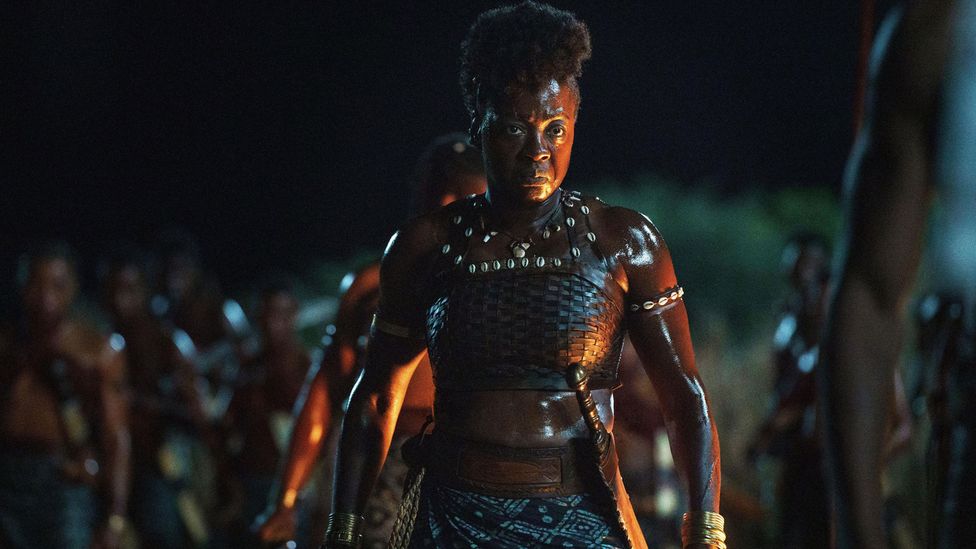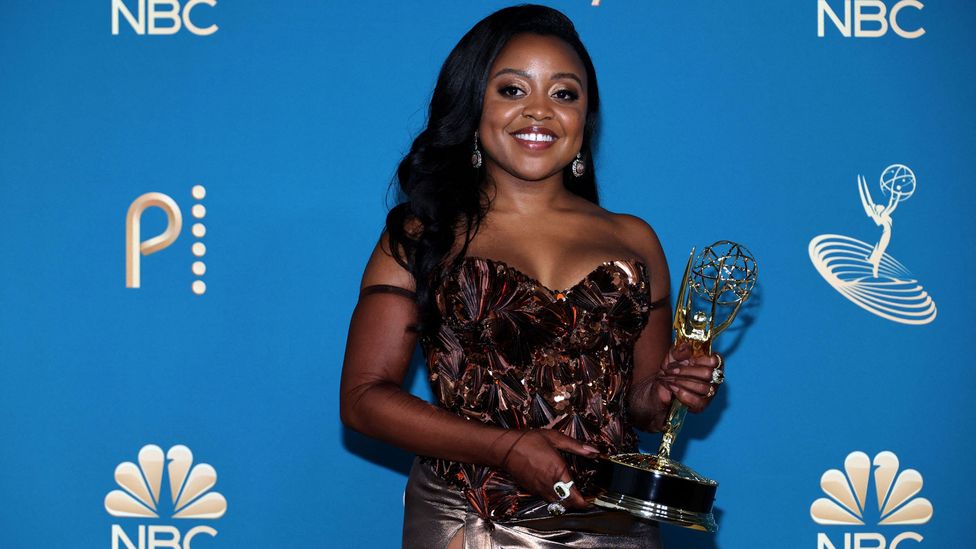The ‘Black Panther effect’ on Hollywood

When Black Panther hit cinemas in 2018 it was a global phenomenon that mesmerised audiences. It was Marvel’s first film with a predominantly black cast, their first superhero film with a black lead and was hailed by many as revolutionary. From the costumes to the characters’ names, for many black viewers in particular, it was a watershed moment – the first time they felt like they could see themselves on screen in a major Hollywood film. Discussions online centred around what African-inspired outfits people would wear to screenings, viral social media posts showed children gleefully finding out their schools were taking them to see it, and across the globe, black communities organised watch parties and special screenings to celebrate this monumental occasion.
More like this:
– Our verdict on Black Panther: Wakanda Forever
– The best films to watch in November
– Why Asian superhero Shang-Chi could change the world
It also importantly defied the industry myth that suggested big-budget black films were not bankable internationally. The film broke global box office records, grossed over $1.3 billion worldwide, and made history by becoming the first Marvel movie to be nominated for best picture at the Academy Awards while taking home three wins for best costume design, production design and original score.

With a $330 million global opening, Black Panther: Wakanda Forever has matched the impact of its predecessor (Credit: Marvel Studios/Alamy)
For entertainment writer Shanelle Genai, Black Panther “felt like a giant cultural shift”. The buzz it generated online was not like anything Genai had seen before: “It was just one of those moments where you had to be there… [it] was a positive and vibrant portrayal of black people on screen which some people had not seen before,” she explains, adding that its positive representation was complemented by the film’s “level of artistry… the costumes, designs and décor is not something you see every day”.
Showrunner and writer Mike Gauyo, who has worked on series including HBO’s Insecure and Netflix’s Ginny and Georgia, agrees that people “were proud of the representation they were seeing” and says he himself saw Black Panther four times in the cinema, dressed in African-inspired garments each time. And that representation extended beyond the actors on screen to the film’s soundtrack, which featured prominent and popular black artists, including Kendrick Lamar, SZA and The Weeknd and showed that the crew and director Ryan Coogler’s “finger was on the pulse for culture” says Genai. Film critic Kathia Woods believes people were so excited because they were “getting to see black lives that weren’t impoverished, they were just living”. As Woods puts it, too, “black people are part of the mission, but we don’t get to lead the mission too often”, so seeing them at the forefront of the action was welcomed – especially within the context of the Marvel universe, which at the time had been criticised for the fact that black characters such as Colonel James Rhodes in Iron Man and Sam Wilson in Captain America had played second fiddle to white heroes.
But what has happened in the four years since? Last Friday, its much-anticipated sequel Black Panther: Wakanda Forever was finally released, enjoying the biggest opening for a November film of all time in the US, making $330 million dollars globally at the weekend box office and earning extremely positive reviews once more. Following the tragic death of the original film’s lead Chadwick Boseman, the sequel begins with the death of T’Challa, aka Black Panther himself, and is a very sombre affair. Depicting the Wakanda kingdom reeling in shock, as his sister Princess Shuri and his mother Queen Ramonda struggle on without him, it also acts as an outlet for the audience’s collective grief over the death of a hugely admired icon, on and off screen. As Marvel boss Kevin Feige said in an interview with Empire magazine, “the world is still processing the loss of Chad, and Ryan [Coogler] poured that into the story”. On top of this, as Genai points out, the film taps into the wider sense of loss that “has been an overarching theme for a lot of people” during the pandemic.
“I think all of us walking into theatres to consume Wakanda Forever are aware that a draft of the film was written and then the star of this franchise tragically died before they could even film a scene,” says Kelley Carter, senior entertainment reporter for ESPN’s Andscape, calling it “a fitting film for the legions of fans around the world”. She also points out how, on top of the film’s returning cast of Wakandan heroes, the film’s villain Namor (played by Mexican actor Tenoch Huerta) is being positively received by critics and audiences as well. “We’ve never seen a film [with both black and brown lead characters] with this kind of a budget being made before – it feels monumental,” Carter adds.
For all the sadness that is connected to the making of Wakanda Forever, the fact it has made a similarly massive commercial and cultural impression as its predecessor is hugely cheering – but it also seems a good time to reflect on how Hollywood has changed or not when it comes to embracing black stories in the time that has elapsed between these two seismic films.
Changing the blockbuster landscape
One clear impact the success of the original Black Panther had is on the make-up of the Marvel universe more generally. Since Black Panther’s release, we have seen Shang-Chi, Marvel’s first East Asian superhero lead, Ms Marvel, the first Muslim and South Asian character in a titular role and Eternals, which was praised for its diverse ensemble which included Marvel’s first gay superhero and the first on-screen deaf superhero. As Feige has said: “Panther really coalesced the notion of, ‘Everybody deserves to see themselves portrayed in these larger-than-life ways’.” When paying tribute to the late Chadwick Boseman in 2020, Simu Liu, who portrays Shang-Chi, commented “without Chadwick, and what he gave to this character, there is no Shang-Chi.”

The Woman King surpassed expectations on its opening weekend at the US box office, showing the appetite for big-budget black-focused stories (Credit: Alamy)
Yet has it led to an uptick in major black-focused films? For Carter, there have been some signs of progress on this front – and a lot of individual “wins” – since its release. This quarter, for example, we have seen Nigerian-American director Chinonye Chukwu’s Till and Gina Prince-Bythewood’s The Woman King making waves as well as Wakanda Forever, while next month the much-anticipated Whitney Houston biopic I Wanna Dance with Somebody, directed by Kasi Lemmons, will hit screens.
Written by Anthony McCarten, who penned mega-hit Queen biopic Bohemian Rhapsody, the latter is expected to be a big deal at the box office, as has been The Woman King: the historical epic about the all-female Agojie army in 19th-Century West Africa, starring Viola Davis, was released around the world in September and October, and considerably outperformed its predicted opening weekend gross in the US. It has so far made nearly $100 million worldwide, again showing what an appetite there is out there for more black stories on the big screen. Recently too, there have been two major black horror film successes: Jordan Peele’s Nope, his third film following his game-changing 2017 debut Get Out, which was released in July and has made over $170 million at the global box office, and the horror reboot Candyman directed by Nia DaCosta, released last year, which made $77 million worldwide – and was the first film with a black female director to open at Number one in the US. On streaming meanwhile, last year’s Netflix movie The Harder They Fall was a glossy, stylish all-black Western featuring a glittering array of stars including Idris Elba, Regina King and LaKeith Stanfield.
In the TV sphere, there has arguably been a positive shift in recent years too. Last year Amazon Studios’ Harlem, about the lives and loves of four black girlfriends in New York, launched, and it will be returning for a second season soon, while Netflix’s teen show On My Block wrapped up after a successful four-season run in October 2021. Most prominently, black super-producer Shonda Rhimes’ Shondaland empire has grown, with Netflix reportedly increasing her original $100 million deal last year and the release of her mega-hit Bridgerton changing the shape of period drama with its racially diverse casting. There has also been the continued critical success of Donald Glover’s groundbreaking comedy-drama Atlanta, whose fourth and final series finished in the US last week, while black stars who started out on the web, such as Issa Rae and Quinta Brunson, have become mainstream phenomenons with their shows Insecure and Abbott Elementary.
When Insecure finished its five-season run in 2021, it was hugely celebrated, with 14 Emmy nominations to its name, and it has secured Rae a further five-year film and TV deal with Warner Bros and HBO. The show, which centred on heroine Issa Dee clumsily navigating her thirties, stood out, like Atlanta as well, for exploring contemporary black life: “It came at a time where we [black audiences] were looking for something that existed in the television zeitgeist that mirrored our own lives,” says Gauyo. “We just weren’t seeing something relatable on television so we latched onto it.” Insecure trended on Twitter weekly when new episodes dropped, and the cast’s interaction with fans on social media, alongside scheduled watch parties, furthered its influence and reach.
Abbott Elementary has been another big deal: a primetime mockumentary sitcom on the ABC network following teachers in an underfunded Philadelphia school, it premiered late last year and made huge waves with its first season, earning great viewing figures, near-universal critical acclaim, and going on to land seven Emmy nominations, and three wins. Like other workplace sitcoms such as The Office and Parks and Recreation, its success has lain in the ordinariness of its situation – only this time, alongside its black creator Brunson, it has a predominantly black lead cast. “When it comes to Abbott, people are just wanting to see a bit of themselves. The show’s comedy is a relief… teachers all around the world watching will be able to [empathise],” says Gauyo.

The success of sitcom Abbott Elementary and its creator Quinta Brunson (pictured) has been a big deal for black representation on TV (Credit: Alamy)
But Carter points out that while progress has been made on the small screen since 2018, “we were already seeing an uptick in black leads in television prior to [Black Panther]” – see shows such as Rhimes’ hit political thriller Scandal (2012-2018), featuring Kerry Washington as fixer Olivia Pope, and sitcom Blackish, which premiered in 2014 and targeted a black viewership “but still was pulling in incredible numbers from a universal audience”. The same applied to music industry drama Empire (2015), which captured more than 17 million viewers in its first season. However, while these various successes have been “colossal from where we’ve come from, they still are crumbs and we need more of [them],” believes Carter.
What type of stories are being told?
Aside from the question of whether we are seeing enough black stories, the nature of the stories being told continues to cause debate. In particular, critics have pointed out with increasing frequency the way in which film and TV can prioritise the platforming of narratives centred on “black trauma“, from police brutality and lynchings to slavery. The latter, in particular, remains a recurring topic in US film and TV: the latest high-profile film on the subject, set to be released in December, is Will Smith’s Emancipation, about a man who escapes a Louisiana plantation. For Gauyo, at times “the slave narrative has been so overdone, but in ways that have been redundant. There haven’t been many fresh takes”. However, last year filmmaker Barry Jenkins’ 10-part Amazon miniseries The Underground Railroad was praised for its distinctive approach to the subject. The small-screen adaptation of the Colson Whitehead novel follows Cora, an enslaved woman trying to escape to freedom through a physical underground railroad network, making literal the old metaphor for the network of safe houses and secret routes that escaped slaves used.
The award-winning series featured some gruesome scenes of torture and brutality but in contrast to those, there were also many scenes of gentleness and tenderness, exploring relationships such as those between a mother and daughter on the plantation. In general, there was less of a focus on slave owners and their cruelty, and much more on the enslaved people themselves and their stories. For Gauyo the series is fresh and “an example of telling something in a different way and from a new perspective that we haven’t seen before”.
There is certainly more room for improvement in getting fair and equal representation in Hollywood. Gauyo says that while “we’ve [black people] had a history of being marketable and showing our success in the television and film zeitgeist, there still seems to be a disconnect with the people at the top who are making decisions to greenlight some of these things”. A 2021 report by management consultancy firm McKinsey and Company revealed that fewer black-led stories get told, and when they are, they have been underfunded and undervalued, despite often earning higher relative returns than other movies. Figures like Brunson and Coogler have broken the mould, as before them have everyone from Rhimes to Spike Lee, but for Woods, they are “outliers and not the norm”.
“Black Panther can only do so much. We have to have people who are actively working in Hollywood to be change agents,” says Carter. This is something Gauyo also agrees with. “To an extent, people look at Black Panther as to why there’s been a certain level of growth in the industry from people of colour,” he says – but as someone who works in Hollywood, he believes more diversity is needed amongst the decision-makers who greenlight projects. The McKinsey and Company research also reveals that black professionals are severely underrepresented in executive decision-making roles throughout the industry. For Gauyo, it’s fantastic that films like Black Panther and shows such as “Insecure and Abbott Elementary get greenlit [now], but the fact is there can be so many more”.

Barry Jenkins’ The Underground Railroad offered a transformative take in the depiction of slavery on screen (Credit: Alamy)
What’s more, black people are not “monolithic”, emphasises Gauyo, and “more stories from “different [black] perspectives” would be welcomed. Genai would like to see a greater amount of everyday stories that reflect contemporary black life and feature relatable, flawed characters alongside the narratives rooted in fantasy and make-believe, like Black Panther, while Woods would like to see more high-profile stories outside of the black North American experience, about the black experience in all different countries and continents. Carter simply wants more black stories given the platform to resonate universally “because we know the audience is there”, as she puts it: the Black Panther franchise’s continued success demonstrates that.
Black Panther: Wakanda Forever is out now
Love film and TV? Join BBC Culture Film and TV Club on Facebook, a community for cinephiles all over the world.
If you would like to comment on this story or anything else you have seen on BBC Culture, head over to our Facebook page or message us on Twitter.
And if you liked this story, sign up for the weekly bbc.com features newsletter, called The Essential List. A handpicked selection of stories from BBC Future, Culture, Worklife and Travel, delivered to your inbox every Friday.








